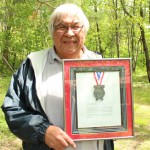Teacher stronger for listening to students

By Laura Dokis
NIPISSING FN – Peter Beaucage has helped hundreds of people overcome their addictions, and trained hundreds more to be effective addiction counsellors.
But the respected Nipissing First Nation Elder, who retired as a Canadore College professor on May 31st, 2013, says no-one got more help from his culture-based program than he did.
“Listening to students share their stories helps me in my own life. I find strength in it,” says Peter. “Prior to 1979, when I look at that part of my life, there was a lot of using and abusing substances myself and it (the medicines and ceremonies) helped my life when I started recovery.”
Since accepting the opportunity to instruct in the Native Drug and Alcohol Counsellor Program being offered by Canadore College in North Bay in 1989, Peter has never veered from his conviction that Anishinaabe cultural teachings are key to tackling addictions experienced by First Nations people.
When students “receive and practice the Teachings they are not being taught to be Elders,” he emphasizes. “The purpose of the Teachings is to help them become people with good moral values and to walk a healthy lifestyle. A lot of the work is done by the student themselves. A lot of the Teachings they already have, it’s just a matter of helping them put them into practice.”
A Second Degree Midewiwin, Three Fires Lodge member, Peter worked for seven years as a Youth and Addiction Worker in his home community, and achieved certification as a fluent Ojibway language speaker at Lakehead University in Thunder Bay before coming to Canadore College. He carried with him a Pipe that was passed to him by community Elders and four Eagle Feathers.
Peter describes his first year as “an experience”.
“They (the college) said ‘Here is your classroom, your chalk, a list of students and your curriculum.’”
The program was located at the Commerce Court Campus in North Bay and because it was newly- purchased, renovations were still underway and the classroom was co-located with the skills and trades programs. He chuckles as he recalls that “heavy equipment used to rumble by and it shook the classroom”.
In 2000, the program was expanded when Barbara Taylor, then Canadore’s Vice-President, Academic, met with the program advisory committee and asked for their recommendations.
“I remember very clearly that day,” says Peter. “The chairman said that they had always wanted the program to be a two-year diploma. Barbara told them, ‘You have it.’
“This was really important. It brought this unique program recognition.”
In its previous form some people saw the Native program as less than the college’s westernized program. Grades couldn’t be assigned for participation in Teachings, but papers about the experience could be written and evaluated as part of a two-year Indigenous Wellness and Addictions Prevention diploma program. It was also in 2000 that the program was given a dedicated classroom space at the College Drive Campus.
The classroom housed a Grandfather Drum, Medicines and many Traditional items used to support Cultural Teachings.
Peter acknowledges the importance of the Medicines being used each and every day and the Sweat Lodge and Pipe Ceremonies, which he believes havehelped many students change their lives.
“I’m proud of the graduates and the work they are now doing in their communities”.
Looking to the future, Peter already has plans to continue his work independently on the “Tobacco road” of healing and recovery. He was initially inspired by his personal recovery and became passionate about sharing his personal experiences and learning from others. He said that working with youth was “always a very rewarding experience”.
Does he have any advice for those in recovery or entering the field of addictions?
“One doesn’t give advice, just suggestions,” he says. “If I give advice and it doesn’t unfold for the person, then it gives them the opportunity to blame, and that’s detrimental. Blaming others for what happens in our lives opens us up to not taking responsibility for what we do.”
His personal path has made Peter very aware of a key difference between mainstream and Aboriginal belief systems.
“Prayer can mean in mainstream culture to request something. Aboriginal Spirituality is not prayer. It’s being grateful for what we have received today and the rest happens on its own, at least that’s what happened for me. When we keep requesting things, sometimes we can’t handle things when they come too fast. It’s through actions that you can be spiritual all day without anyone knowing you are in constant communication with your Creator, walking the Tobacco road.”
Peter expresses gratitude for the opportunities he has been afforded by Canadore College to experience a rewarding career that has brought him many honours and much recognition over the years for teaching excellence and his specialized work in addictions prevention and recovery.
“My wife Debbie is a big part of my support system in all of the work that I do and the Creator has been with me every step of the way. When I started my healing journey I reached out to my Creator and that was the beginning of finding and walking the Tobacco road.”
Laura Dokis served as director of Canadore College’s First Peoples’ Centre, formerly the Aboriginal Learning Unit.


